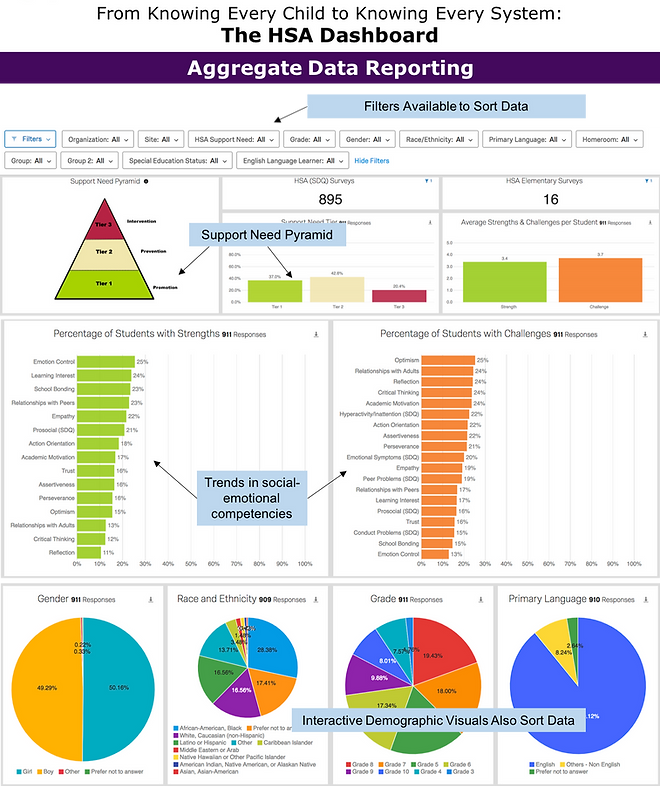
The
Holistic Student Assessment (HSA)
Promoting youth resilience with strength-based data for school and afterschool programs.
What Makes the HSA Unique
Student Voice
The HSA centers youth perspectives by asking students directly about their own experiences, strengths, and needs.
Fast Turnaround
Results are processed in real time, giving schools and programs immediate access to actionable data.
Strength-Based
Each student receives a personalized portrait that highlights both strengths and areas for growth across key resilience domains.
Differentiated Learning
HSA data empowers educators to tailor instruction and supports to meet the diverse needs of individual learners.
Why Use the HSA
What Does the HSA Assess
The HSA is a data-driven tool to promote social-emotional development in young people in schooland afterschool settings. The HSA has 14 scales that are grouped into three domains: resiliencies, learning and school engagement, and relationships.
Engagement in physical and hands-on activities.
"I like to move my body"
Action
Orientation
Self-Regulation of distress and management of anger.
"I react to thinks so quickly I get in trouble."
Emotion
Control
Confidence in expressing oneself and standing up for personal beliefs.
"I stick up for myself against unfair rules."
Assertiveness
Persistence in work and problem solving despite obstacles.
"When I try to accomplish something, I achieve it."
Perserverance
Trust
Perception of other people as helpful and trustworthy.
"I think most people are fair."
Empathy
Recognition of other's feelings and experiences.
"I like to help people with their problems."
Reflection
Self-awareness and internal reflection on societal issues.
"I try to understand the world I live in."
Optimism
Enthusiasm for and hopefulness about one's life.
"More good things then bad things will happen to me."
Learning Interest
Desire to learn and acquire new knowledge.
"I try to learn new things outside of school."
Critical
Thinking
Examination of information, exploration of ideas, and independent thought.
"I think carefully before believing things people tell me."
Academic
Motivation
Desire to learn and acquire new knowledge.
"I try to learn new things outside of school."
School
Bonding
Positive personal connections and the sense of belonging in one's school.
"I care about my school community."
Relationships
with Peers
Desire to learn and acquire new knowledge.
"I try to learn new things outside of school."
Relationships
with Adults
Positive connections and attitudes towards interactions with adults.
"There are adults I look up to and admire."
Dynamic Data in Real-Time
HSA Overview Webinar

The HSA portrait provides teachers and student support staff with a snapshot of a student's long-term social-emotional state. The portrait provides information both on the student's strengths (how well the student is able to cope with stressful factors in the environment), and on the student's struggles (the extent to which the student cannot control the body, mind, and cognition). These portraits can be especially useful in identifying those students who are struggling in a way that may not be immediately obvious to teacher.

The HSA Dashboard dashboard displays your school- or program-level HSA aggregate data to help teachers, staff, and program administrators see the bigger patterns in the individual HSA data. It is securely hosted on the Qualtrics platform and includes filtering and exporting features to give you a more interactive experience with your data.
HSA Add-Ons
Strength & Difficulties Questionnaire (SDQ)
The SDQ provides an initial, brief behavioral screen
for 11 to 16-year-olds. Developed by Robert Goodman, Institute of Psychiatry, King’s College London, the SDQ assesses positive and negative aspects of behavior and indicates whether additional or preliminary clinical interventions are needed.
Mental Health Screeners
Patient Health Questionnaire (PHQ) &
Generalized Anxiety Disorder (GAD-7)
The PHQ-8 is a questionnaire designed to measure symptoms of depression by asking respondents to report how often they have felt particular symptoms of depression over the last 2 weeks.
The GAD-7 is a questionnaire designed to measure symptoms of anxiety by asking respondents to report how often they have felt particular symptoms of anxiety over the last 2 weeks.
